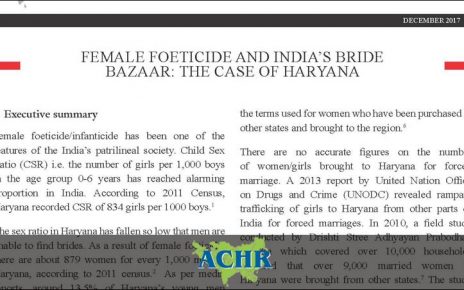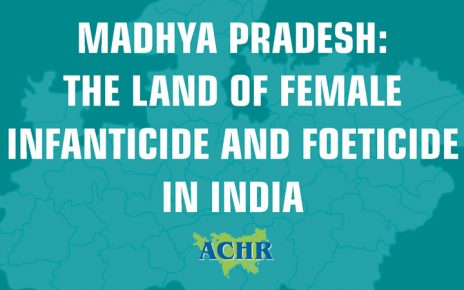Bihar has the 16th lowest Child Sex Ratio (CSR) i.e. number of girls per thousand boys in the age group 0–6 years among 35 States and UTs of India. From 1971 to 2011, Bihar recorded 31 points falls in the CSR. In the 1971 census, the CSR in Bihar was recorded as 964 and it rose to 981 in 1981. However, it fell to 953 in 1991 and further to 942 in 2001 and to 935 in 2011 census.
As per 2011 Census, 24 of 38 districts recorded decline in CSR while 20 districts recorded CSR below state average of 935 girls per 1000 boys. The 21 districts that registered decline in the CSR were Vaishali district with 904 girls per 1000 boys, followed by Patna (909), Muzaffarpur (915), Bhojpur (918), Begusarai (919), Lakhisarai (920), Khagari (926), Saran (926), Nalanda (931), Rohtas (931, Purbi Champaran (933), Mahubani (936), Bhagalpur (938), Sheikhpura (940), Banka (943), Nawada (945), Gopalganj (954), Purnia (954), Jamui (956), Araria (957), Gaya (960) and Katihar (961).
The statistics on Sex Ratio at Birth (SRB) collected for the Annual Health Survey (AHS) in Bihar, one of the 9 high focus States with relatively high fertility and mortality account, are not encouraging. As per the AHS sample survey which claims to be the largest demographic survey in the world, the SRB was respectively 923 in 2011-2012 and 925 during 2012-2013. If the existing under-five mortality rate (U5MR) of 48 deaths per 1,000 births in India is applied in Bihar’s context, the CSR will further reduce to little over 900 females per thousand males. Though the figures of the AHS are only indicative, it indicates that there is no improvement of the CSR in Bihar.
The implementation of the PC&PNDT Act remains extremely poor. As of April 2015, Bihar had a total of 1,621 ultrasound centres but only 1,449 inspections were carried out from 2012 to April 2015. It means that some of the centres were not inspected even once over a period of three years. No license of any erring doctor was suspended in Bihar from inception of the PC&PNDT Act in 1994 to present. This is despite cancellation of registration of 212 clinics, sealing of 139 clinics, suspension of 72 clinics and seizure of 104 sonography machines. It is as if only the machines are at fault!
The convictions under the PC&PNDT Act remain equally rare. During 2009 to December 2014, Bihar registered only 11 convictions as while cases were pending in courts as of September 2014. In May 2015, the Supreme Court slammed the Bihar government over “low” prosecution rate of cases relating to female foeticide in the state after
noting that no case had been registered after 2013. In 15 districts i.e. Araria, Arwal, Banka, Buxar, Gaya, Khagaria, Madhepura, Munger, Rohtas, Saharsa, Samastipur, Saran, Sheikhpura, Sheohar and Sitamarhi, no case has been filed under the PC&PNDT Act as on date.
The Mukhya Mantri Kanya Suraksha Yojna (MMKSY) was launched in July 2008 among others for preventing female feticide and improving sex ratio. The MMKSY has a number of limitations: it targets only girl children from Below Poverty Line (BPL) families, only up to two girl children from a single family are entitled to the benefits of the scheme (3rd girl child will get the benefits only if the 2nd and 3rd girl children are a twin), post birth grant revert back to the Bihar Government in case of death of girl child before maturity or her completion of 18 years of age and one time financial incentive of Rs 2,000/- under UTI-Children’s Career Balanced Plan-Growth Option which will become Rs 18,000 after 18 years is too less an incentive to encourage even the BPL families.
The Comptroller and Auditor General (CAG) questioned investment of the funds under the MMKSY in the Unit Trust of India-Children Career Plan (UTI-CCP) mutual fund. In its report on Public Sector Undertakings of the Bihar Government for the year ended on 31 March 2012, the CAG termed imprudent the Bihar government’s investment of Rs. 268.71 crore of MMKSY fund in UTI-CCP mutual fund without setting up any monitoring mechanism. The CAG pointed out that investment of such a huge amount without any monitoring mechanism exposed the scheme to market risks. According to the CAG report, the net value of Rs. 268.71 crore of the MMKSY fund invested by the Bihar Government in UTI-CCP was Rs 292.41 crore in May 2012. The CAG observed that the net value of the investment would have been Rs.299.09 crore had the fund been invested in any other long term schemes like post office fixed deposit which are secured/guaranteed in nature unlike the UTICCP.
As of February 2016, more than 14.87 lakh beneficiaries had availed the benefit of the scheme with a sum of Rs. 297.56 crore. Access to actual benefits remains in doubt. During a review meeting of the scheme in April 2016, it was found that altogether 11,899 applications were handed over to IDBI Bank out of which only 1,720 bonds were issued by the bank after maturity. The bank had been blocking the payment for no reason.
Conclusion and recommendations
There is no doubt that any programme that seeks to ensure retention of female foetuses ought to address the burden of marriage.
Asian Centre for Human Rights recommends the following to the State Government of Bihar:
- Revise Mukhya Mantri Kanya Suraksha Yojana to increase the amount for post birth benefits at par with other States, scholarship, financial assistance for marriage to be paid to surviving girls and insurance cover in case of death of the parents to the surviving girls;
- Expand the coverage of the Mukhya Mantri Kanya Suraksha Yojana to include all girl children of Bihar irrespective of income of their parents or place of birth and benefits be provided to all the girl children in the family;
- Undertake specific programme for increasing coverage of all families under the Mukhya Mantri Kanya Suraksha Yojana scheme by connecting the programme with all hospitals;
- Link the Mukhya Mantri Kanya Suraksha Yojana with all Anganwadi Centres and Schools to monitor the progress of the beneficiaries;
- Digitise the funds sanctioned and utilization certificates and upload the same in the website of the Department of Women and Child Development;
- Develop mechanisms for effective implementation of the Mukhya Mantri Kanya Suraksha Yojana by digitizing the data of the beneficiaries and ensuring timely payment after maturity;
- Undertake effective measures to monitor and ensure proper implementation of the PC&PNDT Act including mandatory inspection of all the registered centres at least once in a year and initiate trial of the cases registered under the Act in a time bound manner.




